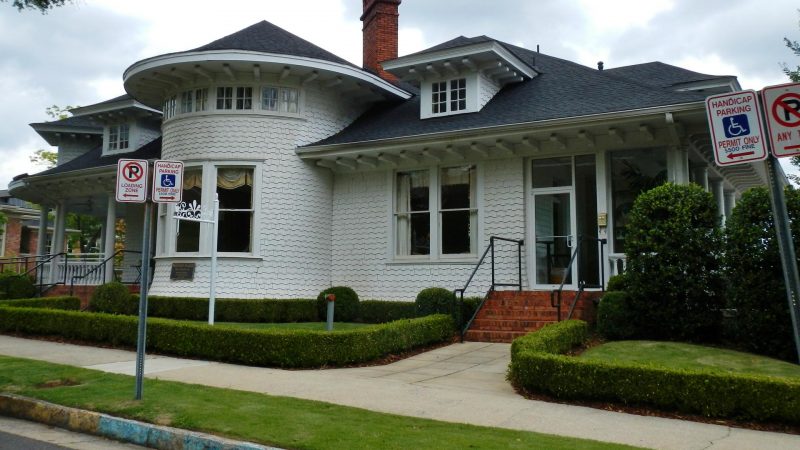Tanya Ott
Tanya Ott is a part-time editor at WBHM and instructor for the University of Alabama's journalism department. She hosts a podcast on business strategy and emerging technologies and trains public radio newsrooms around the country. Over her 30+ year career, she has reported for Marketplace, NPR and other networks and worked at local stations in Florida, Colorado, Georgia and Alabama, including as WBHM's news director from 2002-2013.
Cave 9
There are a lot of well-known arts organizations around Birmingham. Big ones like the symphony and ballet and smaller ones like Red Mountain Theatre Company and Space One Eleven. But there's one very small non-profit that's doing something pretty unusual, as WBHM's Tanya Ott reports.
NonProfit Management
Used to be, it was enough for nonprofits to be run by someone with a big heart and a passion for a cause. Board members were friends and board meetings were more social than business. But, times have changed. A growing number of nonprofits are scrambling for a limited amount of donations, and many nonprofits are adopting for-profit business models to ensure their survival. In the latest installment in our weeklong series "Funding the Arts", Les Lovoy reports on how the executive directors and boards of non-profits are having to use both halves of their brains to manage their organizations.
Loss of Arts Funding
The delicate balance of keeping an arts organization afloat, whether it be a symphony, theater, ballet or museum, relies on a constantly fluctuating web of private, corporate and governmental funding. What happens when a mainstay of that web disappears? In part one of a weeklong series, Reporter Haden Holmes Brown examines the repercussions of the loss of governmental funding.
Beer Brawl
75 years after Congress repealed Prohibition, booze-related debates are flaring up across the country. In Colorado, lawmakers considered limiting the alcohol content of wine and Virginia legislators spent a lot of time talking about Sangria after a restaurant illegally mixed brandy with wine. In Alabama - the "buckle" of the Bible Belt - the battle is over beer. Tanya Ott reports.
Wheat Prices Soar
Wheat prices have doubled this year, hitting an all-time record. That's bad news for consumers who are paying more for food. But it's good news for farmers who are scrambling to cash in on the demand created by a global wheat shortage. WBHM's Tanya Ott reports.
SFS: On The Line
The CQ Press recently released its "Most Dangerous Cities" list, and Birmingham ranked number six. Cityrating.com says murder in the metro area is five times higher than the national average. But what do these numbers really mean? How safe are Birmingham's streets and what can be done to make them safer? Tonight at 6:30 we explore these issues with studio guests and questions/comments from listeners.
SFS: Juvenile Crime
In some ways, juvenile crime is the same as it ever was. There's shoplifting and drugs and gangs. But how those crimes are carried out, and how institutions are dealing with it--from schools to the courts--is changing dramatically. Reporter Gigi Douban takes a look at these issues, and the role of a major new initiative in juvenile detention reform under way in Alabama.
SFS: Broken Windows
"23 in Twenty-three". That's what Birmingham calls its massive community clean-up that currently has crew weed-whacking their way through nearly two dozen communities in 23 days. Officials hope the effort will result in greater community pride and less crime, but as WBHM's Tanya Ott reports "clean" doesn't necessarily translate to "safe".
SFS: By the Numbers
The CQ Press recently released its "Most Dangerous Cities" list, and Birmingham ranked number six. Cityrating.dot com says murder in the metro area is five times higher than the national average. But what do these numbers really mean? How are they calculated and are they accurate? In the first part of our weeklong series "Searching for Safetown", Les Lovoy reports on the reliability of crime statistics.
Searching for Safetown: Crime Stats & Economic Development
Many criminologists believe 'Most Dangerous City' lists are misleading. Still, these rankings can negatively affect economic development. People from the suburbs are squeamish about coming to events downtown. Businesses question plans to expand. can they get employees to work in areas pegged as crime ridden? can they convince customers to shop there?
Life Sentences for Teens
The United States is the only country that convicts young adolescents as adults and sentences them to life in prison without parole. A new report from the Montgomery, Alabama-based Equal Justice Initiative identifies dozens of prisoners serving life sentences for crimes committed when they were 13 or 14. WBHM's Tanya Ott talks with Bryan Stevenson, executive director of the Equal Justice Initiative.
The Ghost Map
In the mid-1800s, London was the largest city in the world with 2.5 million people. But infrastructure hadn't kept pace population, and by 1854 London was gripped by a devastating cholera epidemic. In his book 'The Ghost Map', Steven Johnson tracks the outbreak and relates it to modern public health problems. Johnson talks with WBHM's Tanya Ott.
Conversations with the Homeless Czar
On any given night in the United States, 750,000 people are homeless. President Bush's 2008 budget proposal includes more than $4 billion for homeless services. Governments, non-profits and churches have all been putting record money into programs, but homelessness keeps rising. It's a problem that vexes Philip Mangano, the executive director of the Interagency Council on Homelessness. The so-called "U-S Homeless Czar" was in Birmingham recently and talked with WBHM's Tanya Ott.
On The Line: The Urban Divide
The city of Birmingham faces many challenges, from a shrinking population to struggling schools to a lack of affordable housing. But there are opportunities as well, including a growing downtown loft movement and a thriving arts community. Join us for a discussion about the city's future, as WBHM's Steve Chiotakis and a panel of guests take questions and comments from listeners. This edition of On the Line will be broadcast Tuesday, September 4th from 6:30 - 8 p.m.
Urban Divide: Arts & Economy
Over the last several months, there have been storm clouds on the Birmingham arts and culture horizon. Jefferson County faces a $30 million budget shortfall for 2008, and commissioners say some things may have to go. At the top of that list: eliminating $4.2 million in funding for the arts and culture. Les Lovoy examines how this could affect downtown Birmingham.
Urban Divide: Housing
In our Urban Divide series this week we've heard about how Birmingham is losing population, especially young professionals , and how the schools are bleeding students. More than a thousand students leave Birmingham city schools each year and that means fewer tax dollars for education. Ask anyone who follows these trends what's at the core of the problem and you'll likely hear "Housing". WBHM's Tanya Ott reports.
Urban Divide: Schools
The Birmingham school system is bleeding students at a rate of up to 1,500 a year. It's a problem that has school officials caught in a vicious cycle: fewer students means fewer state dollars. Ultimately, that means less money to spend on teachers, programs and buildings. But school officials hope that a series of new initiatives may help reverse that trend, and ultimately win back the thousands of families who have fled the system. Gigi Douban has that story.
Urban Divide: Population Shift
Cities across the country are attempting to remain relevant in a society that's become increasingly focused on suburbs. The two are caught in a struggle over population, as residents flee urban cores for the 'burbs. And Birmingham is no exception. The Magic City has been losing population since the 1960's with no sign of stopping. That's bad news for a city that would like to regain its standing as a "jewel of the south". Rosemary Pennington has our first story in a week-long series called "Birmingham: The Urban Divide".
Small Banks
As mega banks merge with other mega banks to form super mega banks, there's a counter-trend that may be somewhat surprising. Increasingly, career banking professionals are leaving the big guys to start their own community banks. Les Lovoy reports on how this phenomenon is changing the face of banking in Birmingham.
Sleep Apnea
Many of us enjoy a full, restful sleep each night and wake up the next morning feeling like a million bucks. But, there are many who would pay a million bucks for a good, uninterrupted night's sleep. They suffer from sleep disorders and often feel more exhausted in the morning than they do when their heads hit the pillow at night. Sleep deprivation costs businesses millions of dollars and can put you at risk, even if you don't have a sleep disorder. But as Les Lovoy reports science is gaining ground on a main cause of sleep deprivation, obstructive sleep apnea.
Chilton County Cold Snap
Farmers across the southeast are assessing damage from a weekend cold snap that caused temperatures to dip in the mid 20s in some areas. The fruit was further along in development because of an unseasonably warm weather March - and that means it was more susceptible to the cold. Many growers in Blount County say they suffered a complete loss. In Chilton County - home to Alabama's peach industry - the losses ranged from 30 to 80 percent of the orchards. WBHM's Tanya Ott spent some time in Clanton this weekend and filed this report.
Community College Controversy
Scandal is rocking Alabama's two-year college system. The problems first surfaced in 2004, when Former Governor Don Siegelman was tried on bribery charges alleging he funneled more than a half-million dollars through the state Fire College. Last year, the system's chancellor was dismissed for alleged mismanagement and nepotism. This week, suspicion spread to state lawmakers. WBHM's TAnya Ott reports.
Healing Gardens
Many in the healthcare industry are touting the therapeutic value of healing gardens. The American Horticulture Therapy Association says that these specialized gardens are becoming increasingly common around the U.S. Among their benefits: stimulating memory and alleviating depression. Those are pluses that are especially helpful for a group of senior adults living at the Princeton Towers in Birmingham's Arlington-West End neighborhood. Gigi Douban has the story.
Gadsden Auction Houses
When a city loses its main employer there's often a period of mourning, then an attempt to recover. In Northeast Alabama, one small city that used to be known for steel is making a name for itself in a business with a completely different image. WBHM's Tanya Ott reports.
Steel Deal
At a time when U-S manufacturers are moving overseas for cheap labor and lax environmental codes, a giant German steelmaker plans to build the largest steel mill project the United States has seen in nearly two decades. ThyssenKrupp says it's narrowed the choice to a site in Mobile and another one near New Orleans. Both Alabama and Louisiana offer incentive packages believed to be worth more than one billion dollars, as WBHM's Tanya Ott reports.
Physician Suicide
Many jobs come with risks. But for doctors, especially female physicians - there's one particular occupational hazard that until recently has not received much attention. Reporter Stacey Torch explores the issue of physician suicide and how hospitals and universities like the University of Alabama at Birmingham are addressing it.
Short Stature Kids
For years, growth hormone therapy has been used to treat children at the lowest end of the growth chart. But new research indicates that excessive levels of growth hormone could have long-term health risks. Reporter Brigid Galloway has this first-hand account on the tough decisions parents must make when trying to help their children reach their full potential.
Second Careers
Retirement isn't what it used to be. The U.S. Census Bureau estimates that by the year 2020 people age 55 and older will make up nearly a quarter of the workforce. Reporter Stacey Torch examines the reasons behind this trend as she talks with one Alabama couple who traded in retirement for an organic herb farm.
Taking Mental Health to the Streets
For thousands of people with serious mental illnesses, daily living is an excruciating experience. They have no support system to remind them to take their meds, or make and keep appointments. No one is there to help them shop for essentials, or provide them with a safe place to live and enough food to eat. Consequently, they often live on the street and drift in and out of the city's hospitals and jails. But, as Les Lovoy reports, there's a team of psychiatric professionals here in Birmingham, who are determined to give these troubled individuals a fighting chance.
Nature Deficit Disorder
You've heard of ADD and ADHD. Well, one researcher is lobbying to have NDD added to the scientific lexicon and he says your momma's sage advice to just to outside and play could be the prescription. Dale Short explains.
Tyson Foods Lawsuit
Attorneys will meet with a judge next week in Tennessee to set a trial date for a class action lawsuit against the world's largest meat producer. Plaintiffs allege that Tyson Foods knowingly hired illegal immigrants at meat processing plants in six states, including Alabama. WBHM's Tanya Ott reports.
Tuskegee Doubts
America's first black fighter pilots - the Tuskegee Airmen - are credited with shooting down more than 100 enemy aircraft during World War II. But perhaps their biggest claim to fame was having never lost to enemy fire an American bomber that they were escorting. That's been the story for more than a half-century, but now a former airman and historian says he's uncovered records that disprove that claim. The assertion is causing a firestorm, as Tanya Ott reports.



























